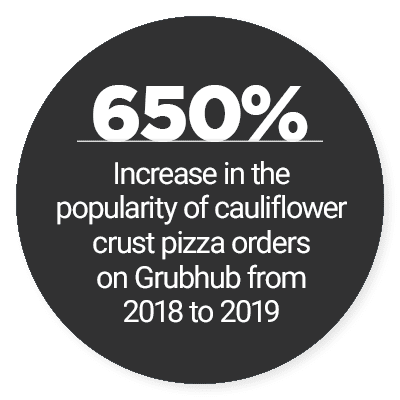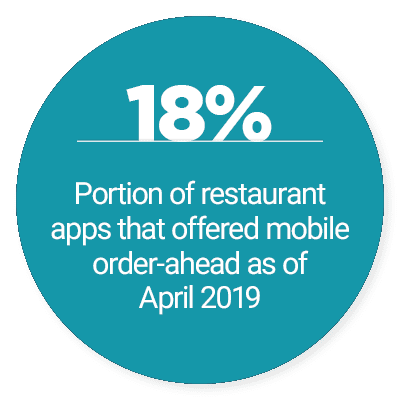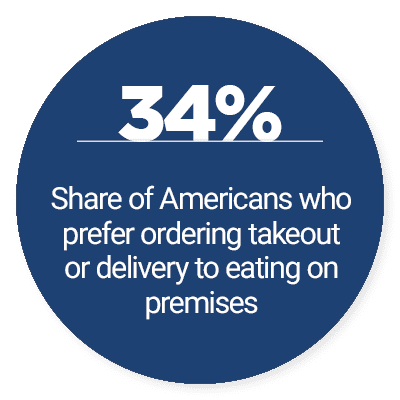Domino’s Mobile Order-Ahead 2.0: How Voice, 5G Can Deliver
 Mobile order-ahead services are being used for more functions than ever, and beyond simply ordering and paying for food. Forty-two percent of consumers use them to find coupons, according to recent research, 38 percent to look up menu items and a full one-third say they use their mobile order-ahead apps more often than they did two years ago.
Mobile order-ahead services are being used for more functions than ever, and beyond simply ordering and paying for food. Forty-two percent of consumers use them to find coupons, according to recent research, 38 percent to look up menu items and a full one-third say they use their mobile order-ahead apps more often than they did two years ago.
Fraudsters continue to haunt the mobile order-ahead industry, however, which is concerning for both mobile app users and the restaurants that provide them. Approximately 49 percent of customers report worrying about credit card theft, while 41 percent fear account takeovers (ATOs). Restaurants are meanwhile growing increasingly alarmed about coupon fraud, which continues to eat away at margins despite shifts to digital discounts.
The January Mobile Order-Ahead Tracker® explores the latest digital ordering developments, including an eatery devoted to airline food, techniques to limit damages from coupon fraud and insights from one of the first restaurants in the space.
 Mobile Order-Ahead Developments
Mobile Order-Ahead Developments
Pizza, Chinese food and other takeout classics used to be delivery’s domain, but the rise of mobile order-ahead apps has radically changed the culinary scene. Grubhub’s annual Year in Food report revealed cauliflower-crust pizza saw a boom among consumers, rising 650 percent in popularity since 2018. Spicy Brussels sprouts and portobello empanadas took second and third place, respectively, with other vegetarian and healthy foods comprising seven of the top 10 orders.
Mobile order-ahead is also driving decisions about which restaurants open at all. One of the more unique is a restaurant and café from airline AirAsia, which opened in December at the Mid Valley Megamall in Kuala Lampur. The restaurant partnered with local café chain T&CO to provide mobile order-ahead services for its in-air classics like Pak Nasser’s Nasi Lemak and Uncle Chin’s Chicken Rice. AirAsia plans to launch its own proprietary ordering app in the coming months.
Fraud is a continuing concern for restaurants and mobile ordering providers, and many are collaborating with technology companies to limit the risk. Food delivery company Easi and payments platform Adyen represent the most recent partnership, with Easi planning to incorporate Adyen’s RevenueProtect platform into its ordering software. RevenueProtect leverages a variety of tools to protect against fraudulent card testing and card not present fraud efforts, including machine learning, algorithmic matching, behavioral analytics and device fingerprinting.
For more on these and other mobile order-ahead news items, download this month’s Tracker.
How Domino’s customers drove its mobile innovations
The array of mobile order-ahead apps on the market is vast compared to a decade ago, when smartphones were in their infancy and mobile ordering was barely a prototype. Domino’s was one of the first innovators on the scene, debuting order trackers, store locators and voice assistants at the behest of customer requests and the careful watching of competitors. For this month’s Feature Story, PYMNTS spoke with Christopher Thomas-Moore, Domino’s vice president of global eCommerce and digital marketing, about the origins of the chain’s digital ordering system and how customers and competitors inspired its features and innovations.
 Deep Dive: QSRs struggle with coupon fraud
Deep Dive: QSRs struggle with coupon fraud
The rise of digital ordering has put new threats like ATOs and data breaches on quick-service restaurants’ (QSRs) radars, but some methods predate digital ordering by decades. Coupon fraud is but one example, with fraudsters illicitly modifying, altering or duplicating coupons to score free or discounted food. This month’s Deep Dive examines the methods fraudsters leverage to exact coupon fraud, and why shifting to digital coupons might only delay the problem rather than stop it outright.
About the Tracker
The monthly Mobile Order-Ahead Tracker®, a Kount collaboration, offers coverage of the most recent news and trends and a provider directory highlighting key players across the mobile order-ahead ecosystem.